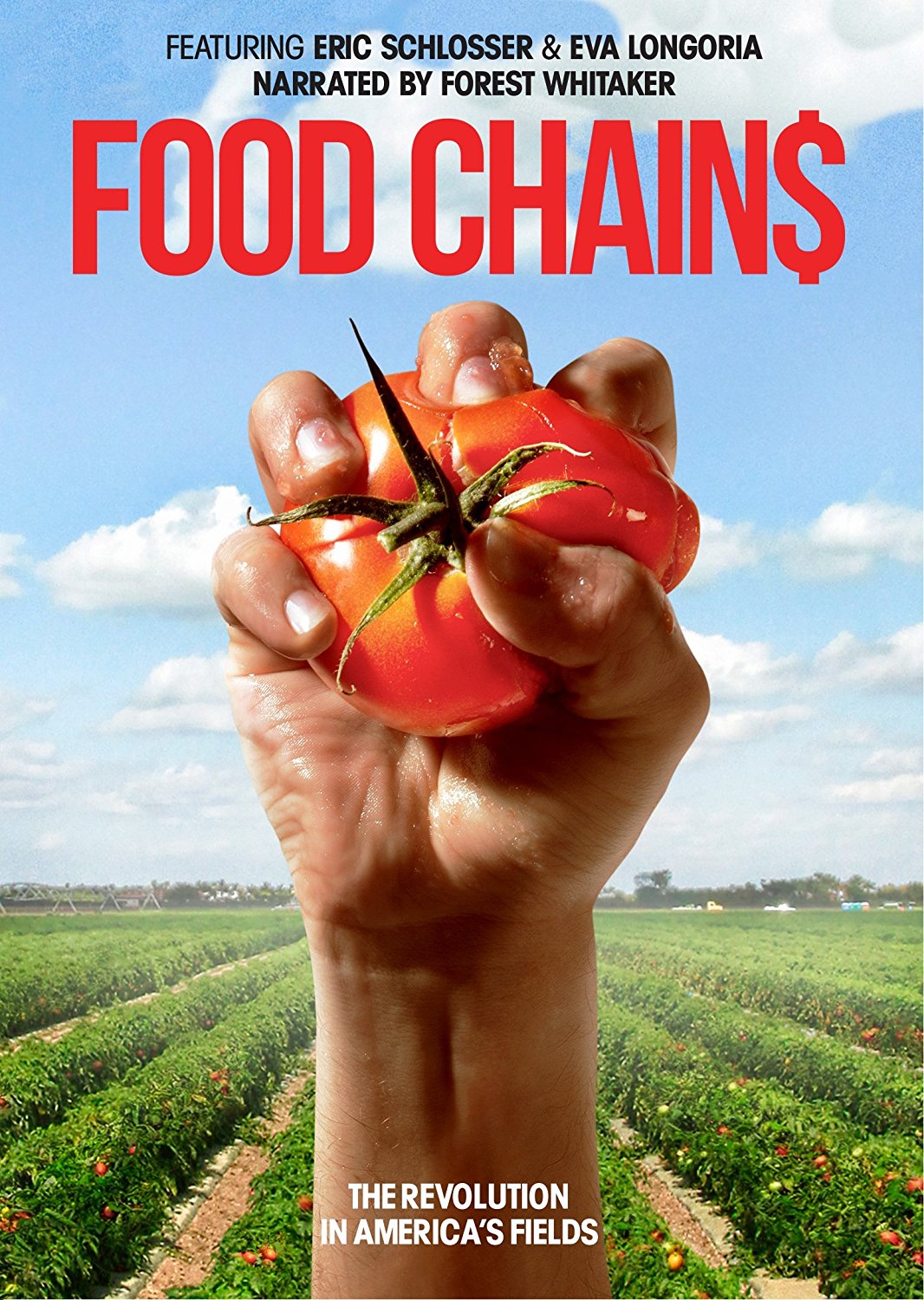Tag Archives: farmworkers
FOOD CHAINS – The Revolution in America’s Fields

Director: Sanjay Rawal
Executive Producers: Eric Schlosser and Eva Longoria
Featuring: Eric Schlosser, Eve Ensler, Barry Estabrook, Dolores Huerta, Robert Kennedy Jr., Kerry Kennedy, Eva Longoria, Alma Martinez. Narrated by Forrest Whittaker.
Studio: Illumine Opportunity Group and Two Moons
Running Time: 1 hr. 22 min.
Released: 2014
Developed by Eva Longoria and Eric Schlosser (producer of Food Inc. and Fast Food Nation), this fair, accurate and exceedingly well-done documentary follows a group of migrant farmworkers who pick tomatoes (for Publix and Walmart) in the fields around Immokalee, Florida.
A small group of tomato workers have formed the CIW (Coalition of Immokalee Workers) to try to improve the deplorable conditions under which farmworkers live and work – and their target is Publix, the largest purchaser of tomatoes in Florida – a super chain worth $30 billion. If they just add a single cent to the wholesale cost of a pound of tomatoes it could double the workers’ pay. But Publix refuses to meet. There is a hunger strike – workers wielding signs line the roadways – but after six days that hasn’t gotten them any closer to a meeting.
The small farmer is caught in the middle; it’s a high stakes game every year. The answer seems to lie with the people at the top – the enormous buying power of the supermarkets. Similar problems exist in Florida’s pepper and cucumber industries. And in California as well. Which produces more fresh food than any other state and so has more migrant workers.
The problems started when Walmart got into the grocery business in the 1970s and everything changed. In order to compete the smaller chains had to consolidate into behemoth supermarket chains creating a Monopsony (a market situation in which there is only one buyer). Price reductions trickled down. The average daily pay for tomato pickers is $42 from 5am-8pm (about a penny per pound – paying another penny would double farmworkers wages). Some weeks, it’s $300-400 other weeks $100. The’r wages total about $10 -13,000 a year.
Sexual harassment of women farmworkers by their field managers is at 80%. The women are afraid to report the incidences for fear of losing their jobs. These are sweatshops in the fields. Actual, literal slave rings were also uncovered. After many protests, the CIW finally got Taco Bell to come aboard what became known as the Fair Food Program, and then Burger King, McDonalds, Chipotle, Trader Joes all eventually agreed to the Fair Food Tomato. Sexual harassment declined, wages increased (by one cent a pound). But the real top of the food chain remains the supermarket conglomerates – and they just won’t come to the table – as of 2014 the ICW had been asking Publix since 2010 to just talk to them. Continuing to embrace the process of creative non-violence – the sixth day of the hunger strike ended in a six mile walk. The ask: end harassment, slavery and pay just a penny more a pound – and talk to us.
In January 2014 Walmart agreed to join the Fair Food Program and expanded its reach to all farmworkers who pick produce here and elsewhere. Publix continued to refuse to even meet asserting that this is a farmer-worker dispute – not theirs.
A couple of asides were touched on but not developed: 1. we also see how these tomatoes are grown – massive amounts of pesticides are sprayed on the fields adjacent to the pickers – a deadly cooling breeze wafts across the field endangering the workers and the future consumers! 2. Floridian farmers are competing with Mexican tomatoes – and sometimes, it’s cheaper to dump the produce rather than pack and deliver. On the other hand, when Clinton signed NAFTA he pretty much tanked the Mexican produce market and small farms went under. 3. In the 60s, Cesar Chavez created the United Farm Workers of California. It wasn’t pretty but ultimately they prevailed. And then in the ‘80s conditions began to deteriorate again. 4, Napa Valley has evolved into the premier wine growing region of the world. Population doubles during harvest season. But the critical farmworkers can’t afford to live there so they have to commute long distances or live in homeless tent communities.
I briefly researched what has happened since the film was released, and as far as I can tell, in May 2016, Publix’s top tomato supplier Red Diamond Farm was fined $1.4 million and ordered to pay $150,000 in back wages for exploiting low wage workers. It appears that Publix continues its stand that this is between the farmer and the worker and that maybe the Feds should get involved. Well they did! And nothing more has happened since then. This film is very effective: For those of us who spend time in Florida, seeing how badly Publix comes off will impact where we shop.
HOW TO SEE IT: Amazon Prime – watch free, or buy the DVD $4.94 or Blu-Ray $12.89